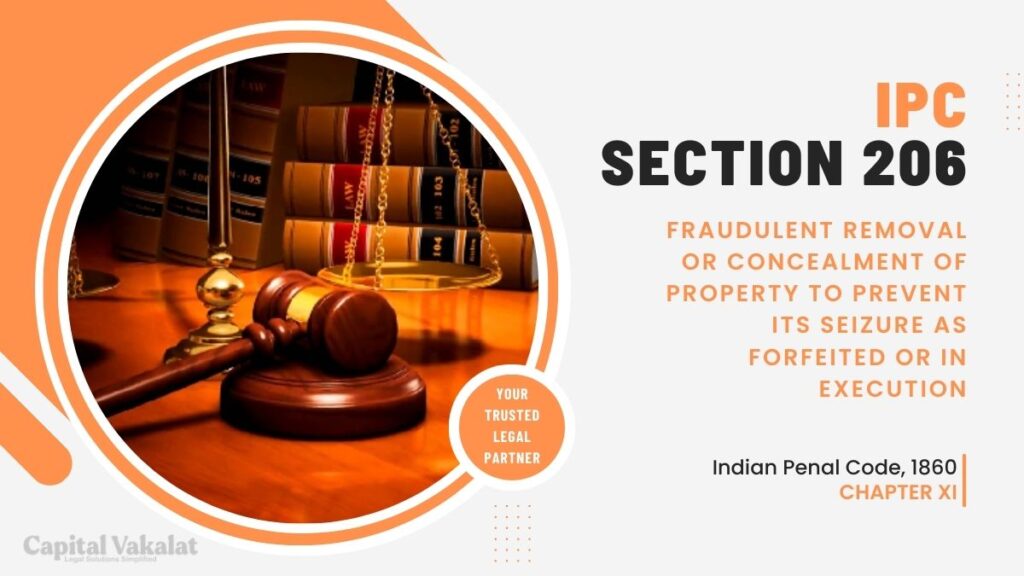In this comprehensive article, we’ll delve into the legal intricacies of Section 206 of the Indian Penal Code (IPC), which deals with the fraudulent removal or concealment of property to prevent its seizure as forfeited or in execution.

This provision of the IPC is a crucial one, serving to safeguard the interests of creditors, litigants, and the justice system as a whole.
Introduction to Section 206 IPC
Section 206 of the IPC addresses situations where individuals resort to fraudulent means to remove or conceal their property with the intention of preventing its seizure as forfeited or in execution. This section is a critical component of the legal framework, designed to uphold justice and protect the rights of creditors and litigants.
Understanding Property Seizure
Property seizure is a legal action taken by authorities to enforce court orders, recover debts, or execute judgments. It is an essential tool in the administration of justice, ensuring that court decisions are not evaded.
The Importance of Section 206 IPC
Section 206 IPC plays a vital role in maintaining the integrity of the legal process. It prevents individuals from using fraudulent tactics to escape their legal obligations and responsibilities.
Key Elements of Section 206 IPC
4.1. Fraudulent Intent
The crux of Section 206 IPC lies in establishing a fraudulent intent. The accused must have a deliberate intention to deceive and hide their property.
4.2. Property in Legal Proceedings
This section applies when the property is subject to legal proceedings, making it essential to ensure that due process is followed.
4.3. Seizure as Forfeited or in Execution
Section 206 IPC is invoked when the property is liable to be seized as forfeited or in execution. This ensures that the law is only applied in relevant cases.
Legal Consequences for Violation
Individuals found guilty under Section 206 IPC may face severe legal repercussions, including fines and imprisonment. The severity of the punishment depends on the extent of the fraudulent actions.
Cases and Precedents
Over the years, various legal cases have shed light on the interpretation and implementation of Section 206 IPC. These cases have helped establish legal precedents for future instances.
Challenges in Enforcing Section 206 IPC
While Section 206 IPC is a potent legal tool, its enforcement is not without challenges. Proving fraudulent intent can be complex, and legal proceedings can be protracted.
Safeguards for the Accused
The legal system also provides safeguards to protect the rights of the accused. It is crucial to ensure a fair trial and protect individuals from wrongful prosecution.
Reforms and Amendments
As the legal landscape evolves, there may be a need for reforms and amendments to Section 206 IPC to address emerging challenges and ensure its continued relevance.
Public Awareness and Education
Public awareness about Section 206 IPC is essential. Knowledge of the legal consequences of fraudulent property removal can act as a deterrent and promote compliance with the law.
Conclusion
Section 206 IPC is a significant legal provision that serves as a deterrent against fraudulent actions aimed at preventing property seizure in legal proceedings. It upholds the integrity of the justice system and protects the rights of creditors and litigants.
Frequently Asked Questions
What are the legal consequences for violating Section 206 IPC?
Violators may face fines and imprisonment, the severity of which depends on the extent of the fraudulent actions.
Are there any safeguards for the accused under Section 206 IPC?
Yes, the legal system provides safeguards to protect the rights of the accused and ensure a fair trial.
Why is public awareness about Section 206 IPC crucial?
Public awareness acts as a deterrent, discouraging individuals from resorting to fraudulent actions to evade legal obligations.
How has legal precedent shaped the application of Section 206 IPC?
Legal precedents have helped clarify the interpretation and implementation of Section 206 IPC, providing guidance for future cases.